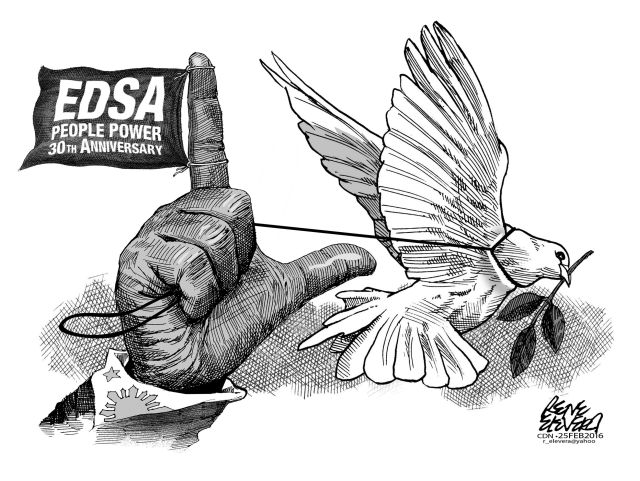
The 30th anniversary commemoration of the first Edsa People Power Revolution may have lost its significance to the millennials or those born after the ‘80s, but people of a certain age, including those who managed to survive the horrors of martial law, know only too well how that event changed so much of the country’s history.
True there are certain figures who were part of that historic event that have since passed away—the late president Corazon Aquino, Manila Archbishop Jaime Cardinal Sin—and others who still remain in the public consciousness either favorably or with stained reputations like Sen. Juan Ponce Enrile. But its legacy still lives on, albeit threatened with the reemergence of the ghost of the Marcos dynasty.
In the last few months into his administration, President Benigno Aquino III has been using every opportunity to remind the voting public to choose wisely his successor in Malacañang.
That’s because some of the contenders to the presidency—Sen. Miriam Santiago and Davao City Mayor Rodrigo Duterte—have noticeably been less than critical of the Marcos legacy with the senator even pointing out that her running mate, Sen. Bongbong Marcos, will be her successor in the event of her incapacity.
It was no small coincidence that the victims of Marcos’s martial law regime have banded together and vowed that they will oppose the vice presidential bid of the younger Marcos, who had the passage of time and the erosion of the Filipinos’ collective memory to thank for, for a generation of Filipinos who have little-to-zero idea of what martial law was.
Not a few of the younger generation now don’t think twice about supporting strong-arm rule to crack down on criminality and violence, and they swoon to the promises of a three-month deadline set by Mayor Duterte to finish criminality and corruption.
Their disillusionment is not helped by the failure of succeeding administrations after Marcos to build on each other’s gains and to learn from the lessons of their past failures.
The fact that a second Edsa Revolution had to occur 15 years after the first in order to oust a leader that was not only judged as corrupt but dangerously incompetent only fed into the yearning of succeeding generations for stable political and economic rule.
That yearning was not only repudiated by the incumbent president’s successor but by his subalterns and loyalists who have tried time and again to discredit his administration that admittedly made inroads in the war against corruption.
The first Edsa Revolution didn’t bear the fruits of prosperity and democratic stability that its supporters hoped for, but that doesn’t mean its legacy had been tarnished at all. If anything, it should be remembered and learned from.
Disclaimer: The comments uploaded on this site do not necessarily represent or reflect the views of management and owner of Cebudailynews. We reserve the right to exclude comments that we deem to be inconsistent with our editorial standards.




